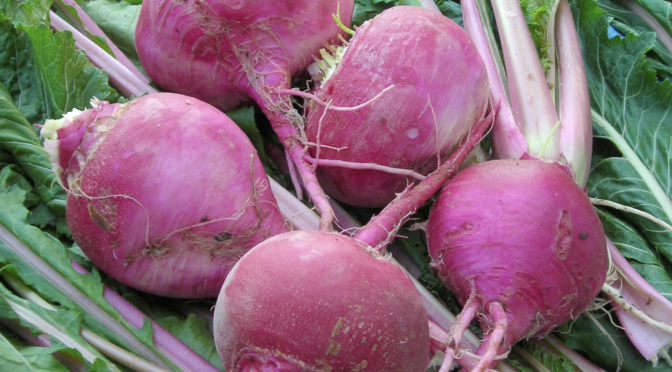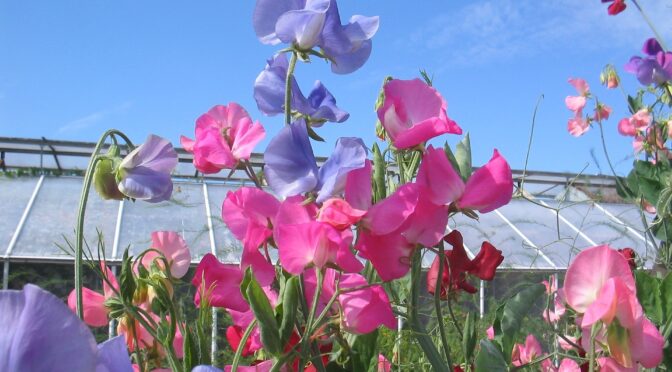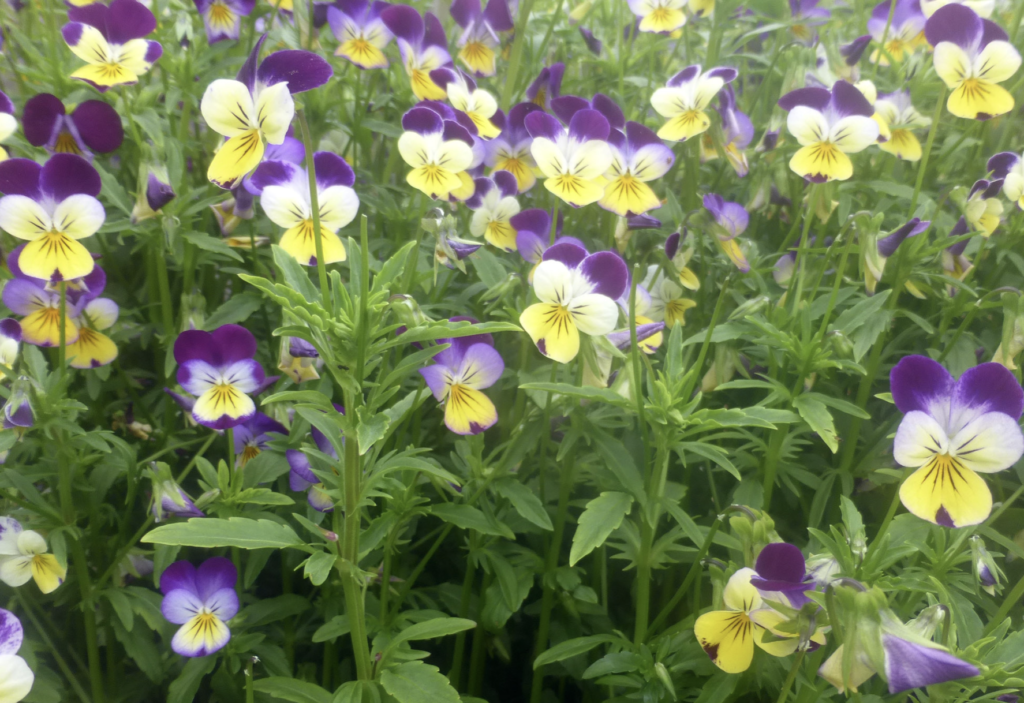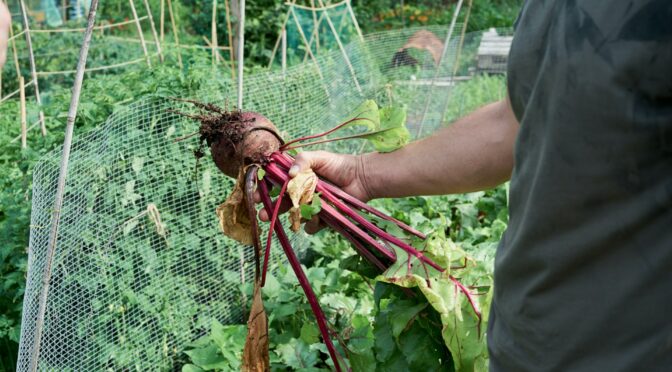The first day of fall is just a few weeks away! Most planting is done for the season, but you still have time for a few crops in the south, including turnips. These versatile vegetables are one of our favorites for their greens and their sweet, mildly spicy roots.
Turnip Varieties
At SESE we carry 5 varieties of turnip. They each have their have unique qualities that may help you select one for your garden.
Amber Globe (Yellow Globe) Turnip (63 days)
One of our favorites for fall, this variety dates back to before 1840. These turnips mature in about 63 days and are best when harvested at a diameter of 3 to 4 inches. Their sweet, fine-grained flesh is creamy yellow.
Purple Top White Globe Turnip (50 days)
Purple Tops are our go-to for classic turnip flavor. This variety dates back to 1880 and gets its name because the tops of the roots turn purple where they’re exposed to sunlight. They mature in about 50 days and are best when harvested at 3 inches in diameter or less.
Scarlet Ohno Revival Turnip (55 days)
These lovely scarlet-skinned turnips are a Japanese variety reselected by Frank Morton of Wild Garden Seeds. They produce some round and some flattened roots. The leaves are shiny and hairless with pink and scarlet stems.
This is an Open Source Seed Initiative variety. The OSSI pledge: “You have the freedom to use these OSSI-Pledged seeds in any way you choose. In return, you pledge not to restrict others’ use of these seeds or their derivatives by patents or other means, and to include this pledge with any transfer of these seeds or their derivatives.” Read more about OSSI here.
Seven Top (Southern Prize) Turnip Greens (45 days)
This variety dates back to before 1880 and is grown only for the delicious greens, not the roots, which are woody. It’s a popular southern variety and great winter green. The leaves grow 18-22 inches tall but should be harvested when young and tender.
Included in Slow Food USA’s Ark of Taste. Read more at Slow Food Foundation.
White Egg Turnip (48 days)
Ready to harvest in just 48 days, this fast-growing variety is popular in the south. It’s named for its egg-shaped roots, which grow partly above the ground and have a slight green tint on the crown. It’s a good bunching variety, and the flesh is white, fine-grained, and mild-flavored.
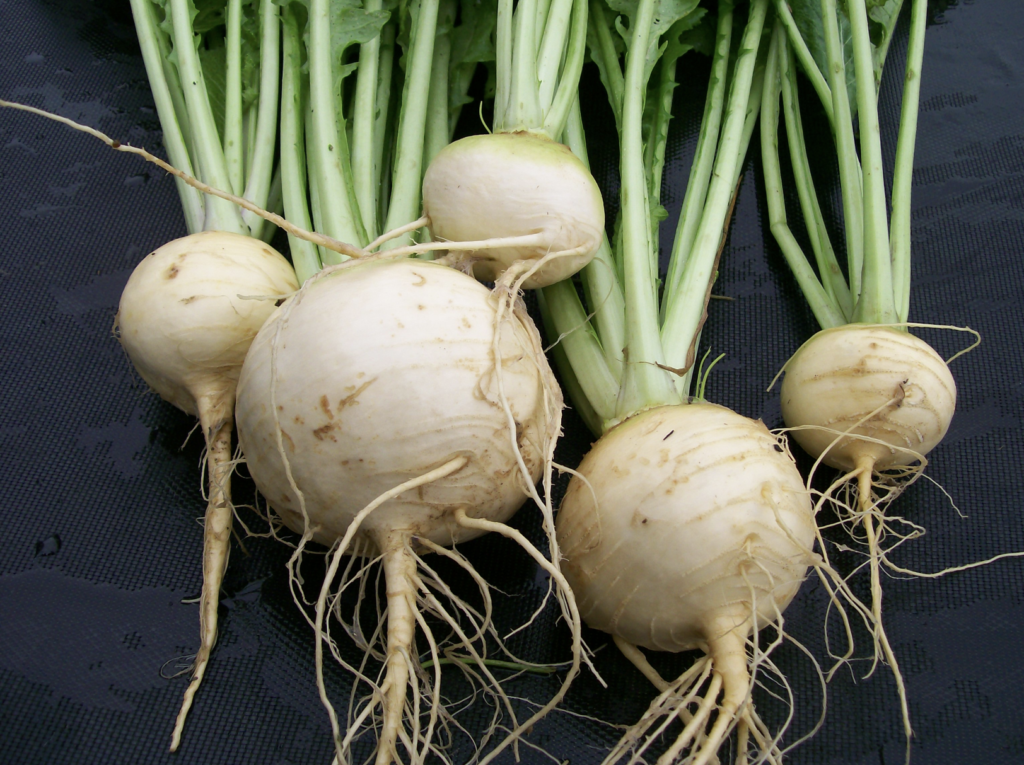
Planting Turnips
The key to great turnips is preparing your soil. You want loose, friable soil to allow roots to expand. We recommend forking your bed and adding a couple of inches of finished compost. We generally recommend against fertilizing. High nitrogen can cause turnips to grow large leaves and tiny roots.
Turnips should always be direct sown. Sow seeds 1/4″ deep and thin to 2-4″ apart, rows 10-12″ apart. Thinning is essential for proper root growth. Fall plantings should be watered consistently if there isn’t rain, especially as the seeds are germinating.
Keep the beds weed-free and mulch around the turnips with straw, old leaves, or other natural mulch.
Harvesting
When harvesting leaves, it’s generally best to harvest them when they’re fairly small. They’re best when they’re young and tender, especially if you’re using them raw. Cut leaves about 2 inches above the crown.
Roots can be harvested at any size but are generally best when they have a 2 to 3-inch diameter.
For longterm storage, harvest roots after it has been dry for a couple of days. A couple of light frosts can make roots sweeter but be sure to harvest before any hard frosts. Gently pull the roots. You may need to use a fork to avoid damaging them.
Storing
Turnip roots can keep for up to 4 months when stored properly. Brush off as much soil as possible but don’t wash your roots. Any bruised or damaged should be set aside for immediate use.
Using a sharp knife or shears, trim leafy tops to 1/4 to 1/2 inch above the root. Don’t trim root ends or hairs; this invites rot!
Turnip roots store best between 32° and 38°F. A root cellar is ideal but, an insulated outbuilding, cool corner of a garage or basement, or a root clamp can also work.
They can be stored in various containers, including plastic totes, waxed cardboard boxes, 5-gallon buckets, or even an old cooler. It’s best if there’s some airflow, so avoid putting the lid on tight, and you may even want to drill some additional holes in the container.
In these containers, you want to keep your roots from touching the container or each other. To do this, you can layer them in damp sand, sawdust, or even old leaves.
You can also store turnips in your refrigerator in the crisper drawer. You don’t want them to dry out, but too much moisture can cause them to mold. It’s best to use perforated plastic bags when storing them in the fridge. Try to set the bags in so that the roots in each bag are in a single layer.
You should check on your turnips every week or two and remove any beginning to soften or rot. The smallest roots generally don’t store as well and should be eaten first.
Freezing
Alternatively, you can cube, blanch, and freeze turnips. Blanch turnips for 3 minutes, immediately cool them in ice water, drain well and freeze.
Using Turnips
Depending on what variety you grow, turnips provide two useful and tasty products greens and roots. Turnips roots are generally peeled, sliced, and cooked before using. The leaves can be eaten cooked or raw, especially if they’re young and tender.
- Add the leaves and grated roots to kimchi.
- Lacto-ferment slices of the roots to add a tasty crunch to salads and sandwiches.
- Roast them with a bit of olive oil, seasoning, and other root veggies.
- Add the young leaves to fresh salads.
- Use the roots and greens in soups.
- Grate the roots up for spring rolls and wraps.
- Sauté the tops as you would other greens.
- Carve the roots into Jack O’Lanterns! In 19th century Ireland, turnips were the traditional JackO’Lantern and were thought to help scare away evil spirits.
- Enjoy the greens on New Year’s for good luck.

